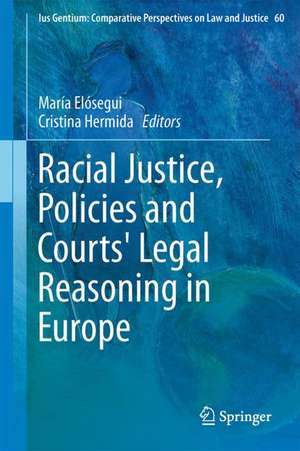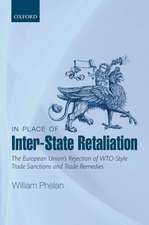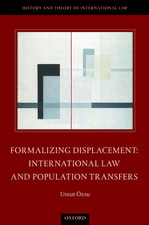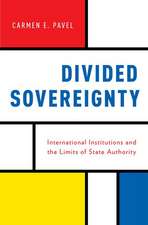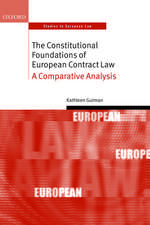Racial Justice, Policies and Courts' Legal Reasoning in Europe: Ius Gentium: Comparative Perspectives on Law and Justice, cartea 60
Editat de María Elósegui, Cristina Hermidaen Limba Engleză Hardback – 19 apr 2017
The study profiles five countries: Germany, UK, Estonia, Portugal and Spain. Each of these belong both to the European Union and to the Council of Europe. Coverage examines the responsibility of the public powers, more specifically of the legislative and judicial power, both of the police and of the judiciary, in persecuting racist behavior. In addition, the authors also consider the increase in racism in groups of citizens.
The authors argue that racial justice is a proactive reinforcement of policies, practices, attitudes and actions that lead to equal access to opportunities for all. After readingthis book, readers will gain a better understanding of the reasoning of legislators, police and judges when dealing with racial discrimination in Europe today.
| Toate formatele și edițiile | Preț | Express |
|---|---|---|
| Paperback (1) | 724.32 lei 6-8 săpt. | |
| Springer International Publishing – 25 iul 2018 | 724.32 lei 6-8 săpt. | |
| Hardback (1) | 730.35 lei 6-8 săpt. | |
| Springer International Publishing – 19 apr 2017 | 730.35 lei 6-8 săpt. |
Din seria Ius Gentium: Comparative Perspectives on Law and Justice
- 20%
 Preț: 1128.16 lei
Preț: 1128.16 lei - 20%
 Preț: 1565.18 lei
Preț: 1565.18 lei - 18%
 Preț: 1115.28 lei
Preț: 1115.28 lei - 18%
 Preț: 904.28 lei
Preț: 904.28 lei - 18%
 Preț: 1001.81 lei
Preț: 1001.81 lei -
 Preț: 180.18 lei
Preț: 180.18 lei - 24%
 Preț: 787.31 lei
Preț: 787.31 lei - 18%
 Preț: 1115.28 lei
Preț: 1115.28 lei - 15%
 Preț: 635.31 lei
Preț: 635.31 lei - 18%
 Preț: 1108.67 lei
Preț: 1108.67 lei - 18%
 Preț: 1007.97 lei
Preț: 1007.97 lei - 18%
 Preț: 784.79 lei
Preț: 784.79 lei - 18%
 Preț: 1223.11 lei
Preț: 1223.11 lei - 18%
 Preț: 891.02 lei
Preț: 891.02 lei - 18%
 Preț: 1009.40 lei
Preț: 1009.40 lei - 18%
 Preț: 1005.74 lei
Preț: 1005.74 lei - 18%
 Preț: 1014.89 lei
Preț: 1014.89 lei - 18%
 Preț: 896.70 lei
Preț: 896.70 lei - 15%
 Preț: 641.85 lei
Preț: 641.85 lei - 18%
 Preț: 779.71 lei
Preț: 779.71 lei - 18%
 Preț: 1010.79 lei
Preț: 1010.79 lei - 18%
 Preț: 1010.03 lei
Preț: 1010.03 lei - 18%
 Preț: 950.52 lei
Preț: 950.52 lei - 15%
 Preț: 638.76 lei
Preț: 638.76 lei - 18%
 Preț: 947.50 lei
Preț: 947.50 lei - 20%
 Preț: 564.78 lei
Preț: 564.78 lei - 18%
 Preț: 1115.14 lei
Preț: 1115.14 lei - 18%
 Preț: 939.42 lei
Preț: 939.42 lei - 15%
 Preț: 635.80 lei
Preț: 635.80 lei - 15%
 Preț: 637.59 lei
Preț: 637.59 lei - 15%
 Preț: 643.65 lei
Preț: 643.65 lei - 24%
 Preț: 809.18 lei
Preț: 809.18 lei
Preț: 730.35 lei
Preț vechi: 890.66 lei
-18% Nou
Puncte Express: 1096
Preț estimativ în valută:
139.77€ • 151.77$ • 117.41£
139.77€ • 151.77$ • 117.41£
Carte tipărită la comandă
Livrare economică 23 aprilie-07 mai
Preluare comenzi: 021 569.72.76
Specificații
ISBN-13: 9783319535791
ISBN-10: 331953579X
Pagini: 222
Ilustrații: XXII, 222 p.
Dimensiuni: 155 x 235 x 16 mm
Greutate: 0.52 kg
Ediția:1st ed. 2017
Editura: Springer International Publishing
Colecția Springer
Seria Ius Gentium: Comparative Perspectives on Law and Justice
Locul publicării:Cham, Switzerland
ISBN-10: 331953579X
Pagini: 222
Ilustrații: XXII, 222 p.
Dimensiuni: 155 x 235 x 16 mm
Greutate: 0.52 kg
Ediția:1st ed. 2017
Editura: Springer International Publishing
Colecția Springer
Seria Ius Gentium: Comparative Perspectives on Law and Justice
Locul publicării:Cham, Switzerland
Cuprins
Introduction (María Elósegui).- Part I: Theoretical and Legal Framework.- Chapter 1. Human Dignity as the Keystone of the Protection of Rights (Rainer Arnold).- Chapter 2. The Reasonable : Towards a Real Interculturality” (Aranzazu Novales).- Chapter 3. Denial or Justification of Genocide as a Criminal Offence in European Law (María Elósegui).- Part II: Specific Thematic Cases Studies.- Chapter 4. Argumentation of the Court of Strasbourg´s Jurisprudence Regarding Discrimination Against Roma (Cristina Hermida).- Chapter 5. Gypsies. Administration of Justice and Automation (Fernando Galindo).- Chapter 6. Violent Urban Gangs. Main Perpetrators in Hate Crimes (David Docal and Alberto Florez).- Part III: Specific Case Studies of Various Countries.- Chapter 7. Is Racial Justice Prevailing in Germany? (Wolfram Bechtel).- Chapter 8. Latest Developments in Combating Racism in the UK (Michael Wine).- Chapter 9. Could the Estonian Ban on Hate Speech be Interpreted in a More Efficient way? (Sten Andreas Ehrlich).- Chapter 10. A Reasonable Accommodation Experience. The Judgment of the Portuguese Constitutional Court Nº 544/2014 of 15th July (Paulo Marrecas Ferreira).- Chapter 11. Racism From the Perspective of the Brazilian Courts of Justice: A Critical Analysis (José Renato Cella and Lahis Pasquali Kurtz).
Notă biografică
María Elósegui
Full Professor of Philosophy of Law and Chair in the Faculty of Law at the University of Saragossa (Spain). PhD in Law and PhD in Philosophy. Research Fellow of the Alexander von Humboldt Foundation with Professor Robert Alexy in the University Christian Albrechts, in Kiel (Germany). Expert independent of the European Commission against Racism and Intolerance of the Council of Europe (ECRI) for 2013-2017. She has been visiting Professor in Glasgow University (Posdoctoral fellow), la Faculté de Droit de Saint Louis, Brussels (Belgium), UCLA, Chicago, Toronto and Laval (Canadá). She received the award Luis Portero for her book on Human Rights and Cultural Pluralism in 2008. Member of the Royal Academy of Jurisprudence and Legislation of Spain. Director of the PhD Programme on Human Rights and Fundamental Freedoms at the University of Saragossa (Spain). Author of 15 books and 86 articles, on legal Argumentation, equality of Races, the Right of Cultural Identity and Gender. For instance, El concepto jurisprudencial de acomodamiento razonable. El Tribunal Supremo de Canadá y el Tribunal Europeo de Derechos Humanos ante la Gestión de la Diversidad Cultural y Religiosa en el Espacio Público, Cizur Menor (Pamplona), Aranzadi, 2013.
Cristina Hermida
Professor of Philosophy of Law in the Rey Juan Carlos University (Spain). PhD in Law. Research Fellow of the Alexander von Humboldt Foundation. Prof. Jean Monnet. Corresponding Member of the Royal Academy of Jurisprudence and Legislation of Spain. Member of the Spanish Association for Spanish Philosophy since 1995. Awarded the Decoration of Honour in Gold for Services to the Republic of Austria in 2011 by President Fischer of the Republic of Austria (Goldene Ehrenzeichen für Verdienste um die Republik Österreich). Awarded a Diploma in 2012 in gratitude for the substantial personal contribution to the educational and scientific sphere development, support forinitiatives, active facilitation of Kyiv University of Law of the National Academy of Sciences of Ukraine, positive image in the international educational environment and on the occasion of the 17th anniversary of the University establishment. In 2013, awarded a fellowship by the National Science Council of Taiwan to teach and research in the National University of Taipei (College of Law-The Center for Criminal Law Studies). Author of books and articles on Spanish thought, Philosophy of Law and European Union Law.
Full Professor of Philosophy of Law and Chair in the Faculty of Law at the University of Saragossa (Spain). PhD in Law and PhD in Philosophy. Research Fellow of the Alexander von Humboldt Foundation with Professor Robert Alexy in the University Christian Albrechts, in Kiel (Germany). Expert independent of the European Commission against Racism and Intolerance of the Council of Europe (ECRI) for 2013-2017. She has been visiting Professor in Glasgow University (Posdoctoral fellow), la Faculté de Droit de Saint Louis, Brussels (Belgium), UCLA, Chicago, Toronto and Laval (Canadá). She received the award Luis Portero for her book on Human Rights and Cultural Pluralism in 2008. Member of the Royal Academy of Jurisprudence and Legislation of Spain. Director of the PhD Programme on Human Rights and Fundamental Freedoms at the University of Saragossa (Spain). Author of 15 books and 86 articles, on legal Argumentation, equality of Races, the Right of Cultural Identity and Gender. For instance, El concepto jurisprudencial de acomodamiento razonable. El Tribunal Supremo de Canadá y el Tribunal Europeo de Derechos Humanos ante la Gestión de la Diversidad Cultural y Religiosa en el Espacio Público, Cizur Menor (Pamplona), Aranzadi, 2013.
Cristina Hermida
Professor of Philosophy of Law in the Rey Juan Carlos University (Spain). PhD in Law. Research Fellow of the Alexander von Humboldt Foundation. Prof. Jean Monnet. Corresponding Member of the Royal Academy of Jurisprudence and Legislation of Spain. Member of the Spanish Association for Spanish Philosophy since 1995. Awarded the Decoration of Honour in Gold for Services to the Republic of Austria in 2011 by President Fischer of the Republic of Austria (Goldene Ehrenzeichen für Verdienste um die Republik Österreich). Awarded a Diploma in 2012 in gratitude for the substantial personal contribution to the educational and scientific sphere development, support forinitiatives, active facilitation of Kyiv University of Law of the National Academy of Sciences of Ukraine, positive image in the international educational environment and on the occasion of the 17th anniversary of the University establishment. In 2013, awarded a fellowship by the National Science Council of Taiwan to teach and research in the National University of Taipei (College of Law-The Center for Criminal Law Studies). Author of books and articles on Spanish thought, Philosophy of Law and European Union Law.
Textul de pe ultima copertă
This volume looks at how courts and the police handle racial discrimination in Europe. The chapters show that beyond legal technique, neither the legislators nor the judges escape from their own emotions when responding to racial discrimination. But, as the authors point out, emotions are not always negative. They can also help in a positive way in judicial interpretation.
The study profiles five countries: Germany, UK, Estonia, Portugal and Spain. Each of these belong both to the European Union and to the Council of Europe. Coverage examines the responsibility of the public powers, more specifically of the legislative and judicial power, both of the police and of the judiciary, in persecuting racist behavior. In addition, the authors also consider the increase in racism in groups of citizens.
The authors argue that racial justice is a proactive reinforcement of policies, practices, attitudes and actions that lead to equal access to opportunities for all. After reading this book, readers will gain a better understanding of the reasoning of legislators, police and judges when dealing with racial discrimination in Europe today.
The study profiles five countries: Germany, UK, Estonia, Portugal and Spain. Each of these belong both to the European Union and to the Council of Europe. Coverage examines the responsibility of the public powers, more specifically of the legislative and judicial power, both of the police and of the judiciary, in persecuting racist behavior. In addition, the authors also consider the increase in racism in groups of citizens.
The authors argue that racial justice is a proactive reinforcement of policies, practices, attitudes and actions that lead to equal access to opportunities for all. After reading this book, readers will gain a better understanding of the reasoning of legislators, police and judges when dealing with racial discrimination in Europe today.
Caracteristici
Examines how courts and the police handle racial discrimination in Europe Goes beyond legal technique to also consider the importance of emotions Profiles five countries who belong both to the European Union and to the Council of Europe Includes supplementary material: sn.pub/extras
